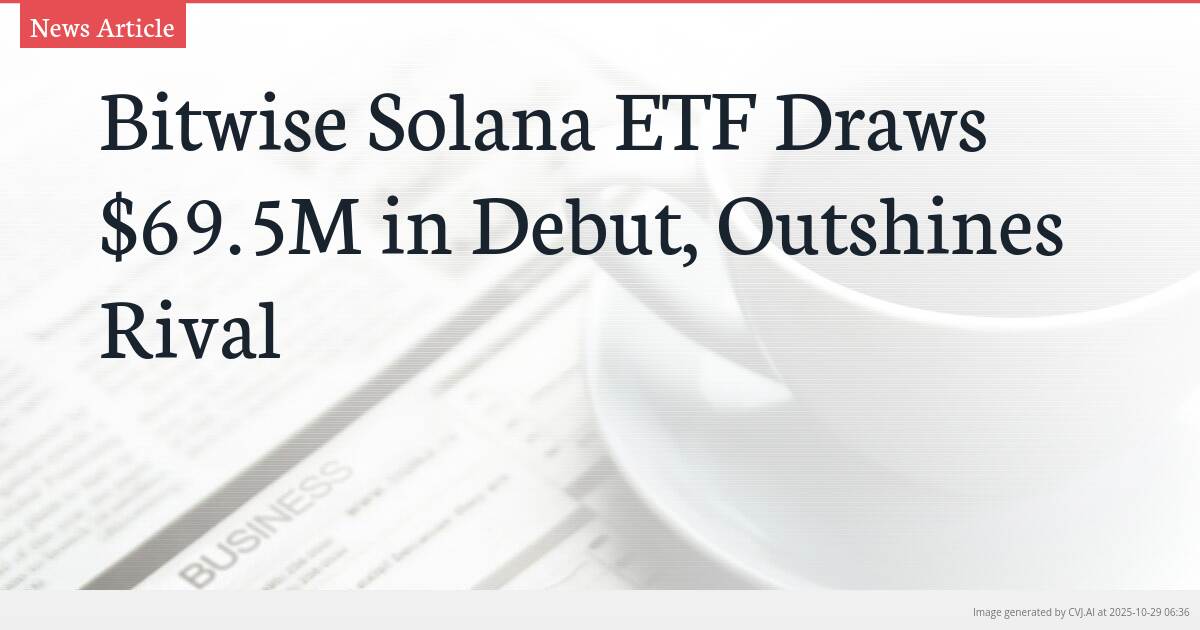This summary text is fully AI-generated and may therefore contain errors or be incomplete.
Introduction
Bitwise Asset Management’s spot Solana ETF (BSOL) launched with explosive momentum, attracting $69.5 million in debut inflows that dramatically outpaced the $12 million drawn by Rex-Osprey’s competing Solana Staking ETF (SSK). The divergent performance signals strong institutional preference for BSOL’s direct exposure model and competitive 0.20% management fee, even as Solana’s price declined 3.1% to $194 on launch day, highlighting a potential decoupling between ETF demand and short-term price movements.
Key Points
- BSOL offers direct Solana exposure with full staking yield (approx. 7%) passed to investors, while SSK provides diversified exposure with only 54% direct SOL holdings
- Bitwise's 0.20% management fee significantly undercuts Rex-Osprey's 0.75% total expense ratio, with BSOL's fee waived for first three months
- The strong debut comes despite Solana's 3.1% price drop to $194, indicating institutional demand may be decoupling from short-term price movements
A Watershed Moment for Institutional Solana Access
The launch of Bitwise’s Solana ETF BSOL represents what Kyle Samani, managing partner at investment firm Multicoin Capital, called “truly a watershed moment” for cryptocurrency markets. Samani emphasized that “all of this changes today,” noting that “the substantial majority of capital in the world was legally not allowed to trade or own Solana… until today.” This regulatory breakthrough has opened Solana exposure to institutional investors who previously faced legal barriers to direct cryptocurrency ownership, creating a new channel for capital allocation to the blockchain network.
The $69.5 million debut inflow for BSOL, trading on the New York Stock Exchange, significantly exceeded market expectations and dwarfed the $12 million attracted by Rex-Osprey’s SSK fund on the Chicago Board Options Exchange. According to Matt Hougan, CIO of crypto index fund manager Bitwise Invest, “I have a feeling the Bitwise Solana Staking ETF, BSOL, is gonna be huge. Institutional investors love ETFs, and they love revenue. Solana has the most revenue of any blockchain. Therefore, institutional investors love Solana ETFs.” This institutional enthusiasm manifested despite Solana’s 3.1% price decline to $194, as tracked by CoinGecko, suggesting that ETF demand may be operating independently of short-term price movements.
Divergent Structures and Fee Models Drive Investor Preference
The stark contrast in debut inflows between BSOL and SSK reveals how investors are evaluating the funds’ fundamentally different approaches to Solana exposure and staking yield. BSOL offers direct spot Solana exposure with all assets staked in-house, aiming to pass along the network’s full staking yield—approximately 7%—to investors according to its Monday announcement. The fund launched with a highly competitive 0.20% management fee that will be waived for the first three months, creating an immediate cost advantage for early adopters.
In contrast, the SSK fund provides diversified exposure rather than pure Solana access. According to its official website, approximately 54% of SSK’s portfolio is allocated to direct Solana holdings, 43.5% to the CoinShares Physical Staked Solana ETP listed in Switzerland, with the remainder in JitoSOL, short-term government obligations, and cash or other assets. This diversified approach comes with a higher total expense ratio of 0.75%, more than triple BSOL’s management fee, and distributes staking rewards monthly, currently classified as a return of capital for tax purposes.
The market’s clear preference for BSOL’s direct exposure model suggests institutional investors seeking Solana access prefer straightforward, cost-efficient vehicles rather than diversified approaches that dilute their target exposure. The 0.20% versus 0.75% fee differential represents a significant long-term cost consideration for large institutional allocations, particularly when combined with BSOL’s promise to deliver the full 7% staking yield directly to investors.
Expanding Solana ETF Landscape Amid Market Volatility
The successful BSOL debut comes as the Solana ETF landscape continues to expand, with Bloomberg ETF analyst James Seyffart noting that Grayscale’s GSOL spot ETF has also received approval and will begin trading on Wednesday. This growing ecosystem of Solana investment vehicles signals increasing mainstream acceptance and regulatory comfort with the blockchain network, though market sentiment remains mixed on near-term price prospects.
Despite the strong institutional demand demonstrated by BSOL’s $69.5 million debut, users of predictions market Myriad, owned by Decrypt’s parent company Dastan, see only a 32.7% chance of Solana hitting a new all-time high this year. The cryptocurrency’s 3.1% decline to $194 occurred alongside Bitcoin’s 3.2% drop from Tuesday’s high of $116,000, indicating broader market pressures affecting cryptocurrency valuations despite specific product successes.
The simultaneous strength in ETF inflows and weakness in underlying asset price creates a complex market dynamic where institutional product adoption and retail trading sentiment appear to be diverging. This suggests that while traditional financial vehicles like ETFs are successfully bringing new capital to Solana, they may not immediately translate to price appreciation if broader market conditions remain challenging or if the new institutional access simply redistributes existing demand rather than creating net new buying pressure.
📎 Read the original article on decrypt.co

